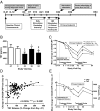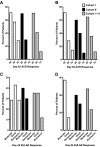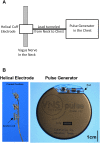Vagus nerve stimulation inhibits cytokine production and attenuates disease severity in rheumatoid arthritis
- PMID: 27382171
- PMCID: PMC4961187
- DOI: 10.1073/pnas.1605635113
Vagus nerve stimulation inhibits cytokine production and attenuates disease severity in rheumatoid arthritis
Abstract
Rheumatoid arthritis (RA) is a heterogeneous, prevalent, chronic autoimmune disease characterized by painful swollen joints and significant disabilities. Symptomatic relief can be achieved in up to 50% of patients using biological agents that inhibit tumor necrosis factor (TNF) or other mechanisms of action, but there are no universally effective therapies. Recent advances in basic and preclinical science reveal that reflex neural circuits inhibit the production of cytokines and inflammation in animal models. One well-characterized cytokine-inhibiting mechanism, termed the "inflammatory reflex," is dependent upon vagus nerve signals that inhibit cytokine production and attenuate experimental arthritis severity in mice and rats. It previously was unknown whether directly stimulating the inflammatory reflex in humans inhibits TNF production. Here we show that an implantable vagus nerve-stimulating device in epilepsy patients inhibits peripheral blood production of TNF, IL-1β, and IL-6. Vagus nerve stimulation (up to four times daily) in RA patients significantly inhibited TNF production for up to 84 d. Moreover, RA disease severity, as measured by standardized clinical composite scores, improved significantly. Together, these results establish that vagus nerve stimulation targeting the inflammatory reflex modulates TNF production and reduces inflammation in humans. These findings suggest that it is possible to use mechanism-based neuromodulating devices in the experimental therapy of RA and possibly other autoimmune and autoinflammatory diseases.
Keywords: cytokines; inflammatory reflex; rheumatoid arthritis; tumor necrosis factor; vagus nerve.
Conflict of interest statement
Conflict of interest statement: M.F., Y.A.L., and R.Z. are employees of and equity holders in SetPoint Medical Corporation. K.J.T. is an equity holder in and has received consulting fees from SetPoint Medical Corporation. S.M., S.G., S.S., P.R.S., and P.P.T. received research grants from SetPoint Medical Corporation to support the clinical study reported here. P.P.T. has received consulting fees from SetPoint Medical Corporation and is currently an employee of GlaxoSmithKline, which holds an equity interest in SetPoint Medical Corporation.
Figures






Comment in
-
Rheumatoid arthritis: Vagus nerve stimulation reduces RA severity in patients.Nat Rev Rheumatol. 2016 Sep;12(9):500. doi: 10.1038/nrrheum.2016.126. Epub 2016 Jul 21. Nat Rev Rheumatol. 2016. PMID: 27440426 No abstract available.
-
The shock tactics set to shake up immunology.Nature. 2017 May 3;545(7652):20-22. doi: 10.1038/545020a. Nature. 2017. PMID: 28470211 No abstract available.
References
-
- Birnbaum H, et al. Societal cost of rheumatoid arthritis patients in the US. Curr Med Res Opin. 2010;26(1):77–90. - PubMed
-
- Helmick CG, et al. National Arthritis Data Workgroup Estimates of the prevalence of arthritis and other rheumatic conditions in the United States. Part I. Arthritis Rheum. 2008;58(1):15–25. - PubMed
-
- McInnes IB, Schett G. The pathogenesis of rheumatoid arthritis. N Engl J Med. 2011;365(23):2205–2219. - PubMed
Publication types
MeSH terms
Substances
LinkOut - more resources
Full Text Sources
Other Literature Sources
Medical

